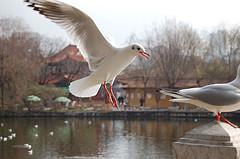| Will Chinese become a "lingua franca"? | |
|---|---|
| Oct 31, 2007 22:37 | |
 | Leonardo: yes I agree economic and political influence is important but the strength of English in the intrenational community will maintain it in that position UNLESS China forces Chinese to be used more widely (in a similar way that the French have insisted French is a language in the Olympics). Remember it is not the number of people speaking a language that makes it a lingua franca / international language but how widely it is used by a sufficient number. Chinese is spoken in enclaves worldwide - as Canadaguy says - and by a few business people who seek an advantage (AND by the next Prime Minister of Australia) but that is all. |
| Nov 1, 2007 20:17 | |
 | "Remember it is not the number of people speaking a language that makes it a lingua franca / international language but how widely it is used by a sufficient number." APAULT, I agree with you on this point. Well, the number of people speaking a language does reflect the influence of a language to a certain extent. Do you agree? Just as there are countless English speakers all over the world, which made English a lingua franca. Wow, this sounds a question of "Chincken or Egg, which comes first". LOL! |
| Nov 6, 2007 16:47 | |
 | Sorry Leonardo, I haven't checked this thread for a while (I put in a request with the Admin to add a feature, making it easier to follow all of one's posts, we'll see if they take up my suggestion). >>Great, you are a musician. What kind of musical instrument are you good at playing? Did you compose music or write lyrics? Your good ear will definitely facilitate your..<< I play the guitar and violin. I play many different Western styles of music on the guitar, jazz being my favourite. On the violin I play mainly in the classical style, although I'm slipping in the occasional popular song there too. I don't compose much music, but when you improvise (as you do in jazz) they say you are composing on the spot. >> Hopefully, you will find much fun in your Chinese-learning process.<< Thank you for your good wishes! |
| Nov 6, 2007 21:31 | |
 | Hey CANADAGUY, Don't be sorry. I don't have regular access to Internet, either. Thanks for telling us so much information about the western music. I am fond of many western music and songs. Celine Dion's songs are quite charming and melodious. Is she a Canadian? Her song "the Power of Love" touch me a lot. As I have learnt French for only one year, it is really a pain to memorize so many forms and tenses of the words. Now that you can learn French well, it will not be much too difficult for you to have a good command of Chinese. Cheers. |
| Nov 6, 2007 22:45 | |
 | Hi Leonardo, Yes Celine is Canadian. French Canadian actually. Most of her music is sung in English now because she has become so famous and there are many more English people out there than French! I think she has a great voice, but I don't care for the songs she sings. She has definitely earned the respect of her peers though, because they know how talented she is. Good luck with your French! |
| Nov 6, 2007 23:27 | |
 | Here's my input on this, because i'm going to major in Second Language Education next year. I'm very interested in one day managing or developing the curriculum for Mandarin bilingual schools. There is a pioneering movement towards bilingual Mandarin schools in Canada. French is our historical second language so nothing will EVER change that. You cannot rewrite history since France was integral in making Canada. It is mandatory that every high school student has to study French language in my province. However, I'm kinda wondering if one day Chinese will become another official language... now it's the third most spoken language here, 10% of Torontonians are ethnically Chinese. Now, I did some research and found there are 3 bilingual Mandarin-English schools in Vancouver, perhaps 15 in Edmonton, and several in Calgary. They have less than 3,000 students now in total, in K-12 levels. Alberta has the most progressive school system in Canada, so that's why they did this experiment in Edmonton and Calgary. Many students there are of Chinese heritage, but a number of them are NOT Chinese. Perhaps Caucasian parents thought it would be cool to have their kids learn Mandarin for their future. My vision is that in 25 years, the Mandarin schools will have spread and be better than today. I saw some pictures, and the kids are learning Chinese calligraphy, etc. and it's cool. In Toronto, there are maybe 5 private Mandarin langauge schools -- for adult learners and kid's camps mainly, but most of the students there are at the lower levels. Chinese is a very difficult language to master. I think it will spread but truth is, only young people have leisure time to study such a difficult language and actually speak it well. |
| Nov 7, 2007 20:31 | |
 | CHYNAGYRL, Congratulation! So you are a teacher. In China, people have a regard for teachers. Teachers are compared to Gardeners; Students are compared to Flowers in the garden. Personally, I show high repect for teachers, since both my mom and sisters are teachers. You will engage in Second Language Education. Sorry, I have forgotten who put forward the theory of " Second Language Acquisition". Here, I would like to talk about the "Bilingual Teaching". There has been an argument over the question "should the Bilingual Teaching start at the early stage of learning" namely, should teachers teach students in two different languages? To make myself clear, I will provide you with an example: in China, in some primary schools, the teachers are required to teach their students in class both in English and in Chinese in order to make the students grasp English at an early stage of the schooling. The problem is that many students usually get confused when they study the two languages at the same time. Should "Bilingual Teaching" start at an early stage of kids' schooling? Is it benificial for little kids? I want to hear your opinion on this topic. |
| Nov 8, 2007 11:05 | |
 | hmm... to answer your question... If we are talking about China, the first language is Mandarin. If the parents want them to learn English I think they should send them to entirely English schools where all subjects are taught in English. Exception for Mandarin classes. The reason I say this, is because the kids will speak Mandarin outside of class and at home anyways. To avoid confusion the parents can start them at bilingual kindergarten with Mandarin and native English speaking teachers. Between the ages of 3-5 the children's language acquisition is incredibly fast. I've seen this where the kids are just incredible in kindergarten with the pronunciation and vocabulary they can learn in one day. Once they have a good foundation, then they'll be ok for going to an all English school. The first year is difficult but after that its OK once they get used to it... |
| Nov 8, 2007 18:34 | |
 | Good luck with your Second Language Education courses ChinaGyrl. I just ended a 22-year stint at teaching Math and Music in high school. The Chinese are really growing in numbers in some big Canadian cities eh? I can see bilingual, Mandarin-English education catching on in Canada. There's lots of potential there. |
| Nov 9, 2007 02:53 | |
 | CHYNAGYRL, Thanks for your input, and I appreciate your view. "Between the ages of 3-5 the children's language acquisition is incredibly fast. " To this point, I agree with you completely. When the children get a little older( 8-12), they could be prone to confusion in handling two languages. Wish you well in your cause ( Bilingual Education). |
Post a Reply to: Will Chinese become a "lingua franca"?








 Copyright © 1998-2026 All rights reserved.
Copyright © 1998-2026 All rights reserved.